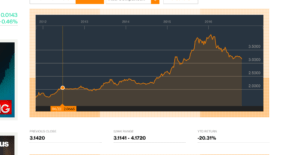Real estate in Miami is about to go down again…
Time for real estate to go down again
Almost a year ago, I was writing about the Real Estate in Miami, and I was already aware that the time for good deals was gone. There were no longer any spaces available at a bargain price. As I had forecasted: things are now quite bad, markets are slow, realtors that were making millions a few years ago are now looking for different jobs, and cranes are still standing high, but some new buildings are starting to look deserted.
Let’s see what has happened:


Most of the price changes were due to a drop in demand due to external geopolitical factors (Brazil, Venezuela, and the immigration of the wealthy Latin Americans to Southern Florida—Miami in particular).
Now, Venezuela is in complete ruin, and the few that have money had already bought properties a few years ago and are now reselling try to cash out and have money to spend.
In Brazil, the currency is devastated. So Brazilians who can sell their assets in US Dollars now have a significant amount of cash available when exchanged for Reais.
So this means that even if they didn’t have a lot of money (in USD), they could make up for it by converting to their currency. So basically, people are letting the deals go and lowering their price expectations.
Now, this does not mean that there is going to be a catastrophe (or at least not anytime soon), as interest rates are still very low, and banks are still lending. But inventory is high, and buyers have greater choices making the time to sell of increasing importance.
Also, most of the foreign buyers who have purchased a property in South Florida in the last few years were cash buyers. Therefore, even if the market continues to go down as it is doing slowly, we will never experience the same situation that we did in 2008 when prices were coming down due to the inability of landlords make their mortgage payments.
Who is buying again?
Well, as we know, people with bad credit are taking advantage of the readily-available bank money and low-interest rates. So they are working to return to a 600 credit score to be able to own property, thus lowering their monthly expenses. Basically, in some blue-collar areas of Miami, or class C, rents are becoming pretty damn expensive. In Fort Lauderdale, Hallandale or Hollywood, you need, on average, $1700 a month for a three-bedroom residence.
The same goes for semi-ghetto areas such as Miami Gardens, where to rent a 1500 square feet house, you need at least $1500. So, with a less than 4% interest rate on a 30-year loan, mortgage payments will be much cheaper than rent. Mostly, buyers are buying because they are saving money by doing it rather than paying rent. Rents will likely start dropping a bit anytime soon.
If you saved your money, did your homework, worked hard, risked your money, bought when nobody was even touching real estate, and now you are enjoying the fruits of your work, why shouldn’t you enjoy the rewards?
My intuition a few years ago was right. Realtors were always trying to discourage you from class c areas, saying that they would not appreciate much. My math was saying, however, that this was bullshit.
Rent was more expensive—much more than buying a property. So, by the time six years had passed, all those landlords foreclosed upon could once again be eligible to purchase a property. Obviously, the first thing they would do was obtain a mortgage and buy a house—sometimes even more than one.
In Naples, Florida, I purchased assets that are now worth easily 5 times more. Those properties were in low-income areas. However, properties on the beach and inexpensive areas did not appreciate as much. Not even close.
Now, it’s time to sell—at least to unload the portfolio.
Why should we get rid of good cash flow properties if, regardless of their value, they are producing a good income?
I think there is a risk: politicians will subtly try to reduce investors’ profit through taxes.
Most of the properties in southern Florida bought by investors and hedge fund managers.
They amassed properties, rehabbed them and rented them out. When they did the math, as we did, the simple real estate guys were not that bad, and they not only wanted to have a piece of the pie., they also wanted the entire pie. So they came from New York with millions of dollars, buying properties like people buy apples at the supermarket.
Property values have increased, and the government knows that most of the profit left in the hands of investors. Right now they can subtly take part of the profit, and at the end of the day, investors cannot complain much. So what are they doing?
In the meantime, cities are getting organized. With thousands of inspectors, they create the most stupid laws to charge you money, fees, and any kind of shit, for the most insignificant things. If your tenant parks the car a tiny bit off from the property lines, the landlord gets fined or issued a violation. They’re starting to check all of the old permits to evaluate if they are up to code. They are making new regulations to force new construction work, and along with those new codes, there are fines, permit fees, inspector fees, etc. levied.
They are doing it all on purpose. They are trying very hard everywhere to extract money from the landlord, even when it’s clear that the house is in good condition and no work is needed. In this scenario, it’s clear that taxes are also increasing, and they will increase more, forcing yields to decline and forcing investors to sell.
The crowds considered by politicians are not the lucky or good investors. The crowds are the poor that cannot afford rent, and they always make more noise. This is what really pissed me off.
If you saved your money, did your homework, worked hard, risked your money, bought when nobody was even touching real estate, and now you are enjoying the fruits of your work, why shouldn’t you enjoy the rewards?
But nobody will care about the meritocracy of some wise investors. We will be and always have been the easiest target to hit. When money is needed, the middle class are the ones that need to pay for it more than anybody, even more than the rich.
America will soon face an issue that cannot be solved anymore with quantitative easing. Taxes will need to increase. Real estate assets, mostly when paid for and belonging to investors, will be an easy target.
For this reason, I will not hold many more properties; it’s time to sell and look elsewhere. I will only keep one-quarter (¼) of my portfolio.
For more news on great investments stay tuned.